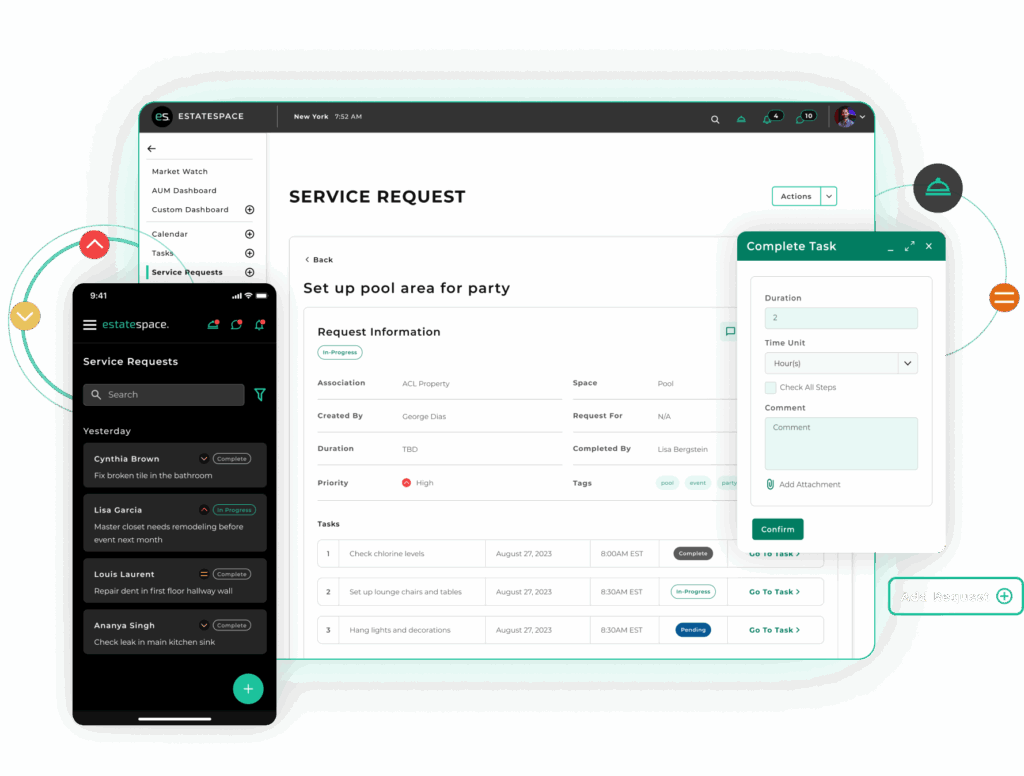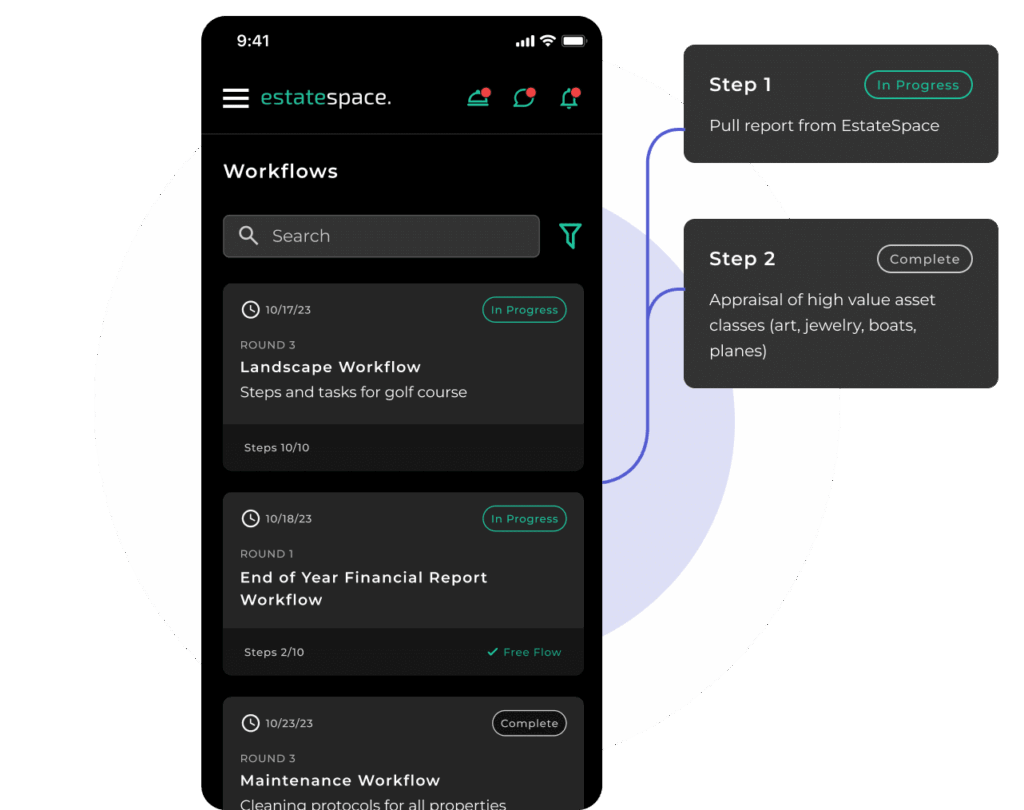Managing a luxury estate involves far more than watching over a single property. In fact, each estate works as a complex system with connected operations, different stakeholders, and detailed workflows that need smart coordination. Furthermore, successful estate ecosystem management requires understanding how every part—from staff and vendors to assets and processes—works together to create smooth operations.
However, many estate professionals struggle with the complexity of coordinating these many-sided operations. As a result, the most effective approach to estate ecosystem management involves creating structured frameworks that help all stakeholders work together efficiently while keeping the high standards expected in luxury property management.
Understanding the Modern Estate Ecosystem
Today’s luxury estates operate as smart systems that go far beyond traditional property management. Specifically, estate ecosystem management includes coordination between household staff, outside vendors, family offices, and property owners to ensure smooth daily operations.
Moreover, the modern estate ecosystem includes multiple layers of complexity. These range from managing high-value assets and coordinating maintenance schedules to organizing events and hosting frequent guests. Additionally, asset managers increasingly expect integrated oversight that provides complete visibility into all estate operations and asset performance.

Key Components of Effective Estate Ecosystem Management
Staff Coordination and Workflow Management
Effective estate ecosystem management begins with creating clear communication channels and defined workflows among all team members. Next, this involves establishing protocols that ensure every staff member understands their duties and how their work fits with broader estate operations.
Furthermore, successful coordination requires putting in place systems that track task assignments, completion deadlines, and quality standards. This systematic approach prevents operational gaps while ensuring consistent service delivery across all estate functions.
Vendor and Service Provider Integration
Modern estate ecosystem management requires smooth integration with outside service providers and vendors. Therefore, establishing clear protocols for vendor communication, performance monitoring, and service delivery becomes essential for maintaining operational excellence.
Additionally, effective vendor management involves creating standardized processes for service requests, project coordination, and quality control. This systematic approach ensures that outside providers understand estate standards and can deliver services that align with family expectations.
Asset Tracking and Portfolio Oversight
Complete estate ecosystem management includes smart tracking of both financial and physical assets. Specifically, this involves keeping detailed records of artwork, vehicles, jewelry, and other high-value items that often represent significant portions of family wealth.
Essential asset tracking components include:
- Digital inventories with photos and valuations
- Insurance documentation and coverage details
- Maintenance schedules and service records
- Location tracking for multiple properties
Moreover, effective asset management requires integration with family office operations to ensure investment decisions consider the complete portfolio rather than focusing solely on financial instruments. This complete approach enables more informed decision-making about asset allocation and risk management.
Technology Integration in Estate Ecosystem Management
Modern estate operations require smart technology solutions that can handle the complexity of coordinating multiple stakeholders and processes. As a result, effective estate ecosystem management depends on platforms that integrate various operational functions while keeping the security and reliability required for high-value properties.
Furthermore, project managers need access to real-time data and communication tools that enable them to coordinate complex renovations and maintenance projects without disrupting daily estate operations. Therefore, the right technology infrastructure becomes essential for keeping operational efficiency while supporting long-term estate planning goals.

Communication Protocols for Complex Estate Operations
Setting up clear communication protocols represents a key aspect of successful estate ecosystem management. Specifically, this involves creating channels that enable efficient information flow between household staff, outside vendors, family members, and professional advisors.
Moreover, effective communication systems must handle the discretion and privacy requirements typical of ultra-high-net-worth families. Therefore, putting in place secure communication platforms with appropriate access controls ensures that sensitive information remains protected while enabling necessary operational coordination.
Financial Oversight and Budget Coordination
Complete estate ecosystem management requires smart financial oversight that tracks expenses across all operational categories. Next, this includes monitoring costs for staffing, maintenance, vendor services, and asset management to ensure spending aligns with approved budgets.
Additionally, effective financial coordination involves creating transparent reporting systems that provide family office teams and principals with clear visibility into estate operational costs. This transparency enables better decision-making about resource allocation and operational priorities while supporting long-term wealth preservation strategies.
Quality Control and Performance Monitoring
Keeping consistently high standards across all estate operations requires systematic quality control and performance monitoring. Therefore, effective estate ecosystem management involves putting in place regular assessment protocols that evaluate staff performance, vendor service quality, and overall operational efficiency.
Furthermore, performance monitoring should include feedback mechanisms that enable continuous improvement of estate operations. This ongoing optimization ensures that the estate ecosystem continues to evolve and adapt to changing family needs and operational requirements.
Security and Privacy Considerations
Estate ecosystem management must address the unique security and privacy requirements of ultra-high-net-worth families. Specifically, this involves putting in place protocols that protect sensitive family information while enabling necessary operational coordination among staff and vendors.
Critical security measures include:
- Secure communication platforms with access controls
- Background checks for all staff and vendors
- Visitor management and access protocols
- Emergency response and evacuation plans
Moreover, security considerations extend beyond information protection to include physical security coordination, visitor management, and emergency preparedness. Therefore, complete estate ecosystem management integrates these security requirements into daily operations without compromising service quality or operational efficiency.
Scaling Estate Operations Across Multiple Properties
Many ultra-high-net-worth families manage multiple properties, which adds complexity to estate ecosystem management. As a result, effective coordination requires systems that can scale across different locations while keeping consistent standards and operational protocols.
Additionally, multi-property management involves coordinating travel logistics, staff scheduling, and vendor services across different geographic locations. This complexity demands smart planning and communication systems that ensure smooth operations regardless of family location or property usage patterns.
Technology Solutions for Estate Ecosystem Management
Modern estate operations benefit significantly from complete platform solutions that integrate multiple operational functions into unified systems. These platforms enable estate managers to coordinate complex operations while providing family office teams and principals with real-time visibility into all estate activities. As property management industry trends for 2024 show, technology integration has become essential for modern estate operations.
Furthermore, effective technology solutions should handle the specific requirements of luxury estate operations, including discretion, security, and the ability to handle complex, multi-property coordination. The right platform becomes essential for supporting smart estate ecosystem management while reducing operational complexity. Learn more about integrated estate management solutions that address these unique requirements.
Building Sustainable Estate Operations
Successful estate ecosystem management focuses on creating sustainable operations that can adapt to changing family needs and evolving operational requirements. This involves developing flexible systems and protocols that keep high service standards while handling growth and change.
Moreover, sustainability in estate operations extends to staff development, vendor relationships, and asset management strategies that support long-term value preservation. Therefore, effective estate ecosystem management considers both immediate operational needs and long-term strategic goals to ensure continued success.
The complexity of modern estate operations demands smart coordination and management strategies. By putting in place complete estate ecosystem management approaches, families can ensure their properties operate efficiently while supporting their lifestyle and wealth preservation goals. Whether managing a single estate or coordinating multiple properties worldwide, structured estate ecosystem management provides the foundation for exceptional service delivery and operational excellence.
Ready to optimize your estate ecosystem management? Discover integrated solutions that can streamline your operations while keeping the luxury standards your family expects.



